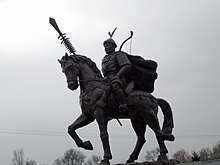Emperor Taizong of Jin
| Emperor Taizong of Jin | |||||||||||||
|---|---|---|---|---|---|---|---|---|---|---|---|---|---|
 |
|||||||||||||
| Emperor of the Jin dynasty | |||||||||||||
| Reign | 27 September 1123 – 9 February 1135 | ||||||||||||
| Born | 25 November 1075 | ||||||||||||
| Died | 9 February 1135 (aged 59) | ||||||||||||
| Spouse | Empress Qinren | ||||||||||||
| Issue |
Puluhu Hulu Hulubu Aludai Alubu Hushahu Alin Alu Gulan Hulijia Shentumen Huboshu Wolie Gusha |
||||||||||||
|
|||||||||||||
| Father | Wanyan Helibo | ||||||||||||
| Mother | Lady Nalan | ||||||||||||
| Full name | |
|---|---|
| Wanyan Sheng (sinicised name) Wuqimai (Jurchen name) |
|
| Era dates | |
| Tianhui (天會; 1123–1135) | |
| Posthumous name | |
| Emperor Tiyuan Yingyun Shide Zhaogong Zhehui Rensheng Wenlie (體元應運世德昭功哲惠仁聖文烈皇帝) |
| Emperor Taizong of Jin | |||||||
| Chinese | 金太宗 | ||||||
|---|---|---|---|---|---|---|---|
|
|||||||
| Wuqimai | |||||||
| Traditional Chinese | 吳乞買 | ||||||
| Simplified Chinese | 吴乞买 | ||||||
|
|||||||
| Wanyan Sheng | |||||||
| Traditional Chinese | 完顏晟 | ||||||
| Simplified Chinese | 完颜晟 | ||||||
|
|||||||
| Transcriptions | |
|---|---|
| Standard Mandarin | |
| Hanyu Pinyin | Jīn Tàizōng |
| Transcriptions | |
|---|---|
| Standard Mandarin | |
| Hanyu Pinyin | Wányán Wúqímǎi |
| Transcriptions | |
|---|---|
| Standard Mandarin | |
| Hanyu Pinyin | Wányán Shèng |
Emperor Taizong of Jin (25 November 1075 – 9 February 1135), personal name Wuqimai, sinicised name Wanyan Sheng, was the second emperor of the Jurchen-led Jin dynasty, which ruled northern China between the 12th and 13th centuries. His regnal name was "Tianhui" (天會). During his reign, the Jin dynasty conquered the Khitan-led Liao dynasty. He then led the Jurchens in their campaigns against the Song dynasty, captured the Song capital in 1127 and went on to occupy most of northern China. After his death, he was posthumously honoured with the temple name Taizong by his successor, Emperor Xizong.
Wuqimai was the fourth son of Helibo and his primary consort, Lady Nalan (拏懒氏). He was a younger brother of Aguda (Emperor Taizu), the founder and first emperor of the Jin dynasty. He succeeded his brother in 1123. Two years later, the Jin general Wanyan Loushi (完顏婁室) led forces to attack the Khitan-led Liao dynasty and succeeded in capturing Emperor Tianzuo, the last Liao ruler, thereby ending the Liao dynasty's existence.
In October 1125, Emperor Taizong waged war against the Han Chinese-led Song dynasty and ordered his fifth brother, Wanyan Gao (完顏杲), to lead the Jin armies to attack Bianjing (present-day Kaifeng, Henan Province), the Song capital, from two different directions. The Song general Li Gang (李綱) led fierce resistance against the Jin invaders. After some time, the Jin and Song dynasties agreed to a truce. In August 1126, Emperor Taizong ordered Wanyan Zongwang (完顏宗望) and Wanyan Zonghan to lead Jin forces to attack and besiege Bianjing again. This time, the Jin dynasty not only conquered Bianjing, but also captured Emperors Huizong and Qinzong of the Song dynasty. This event, historically known as the Jingkang Incident, marked the end of the Northern Song dynasty and beginning of the Southern Song dynasty.
...
Wikipedia
